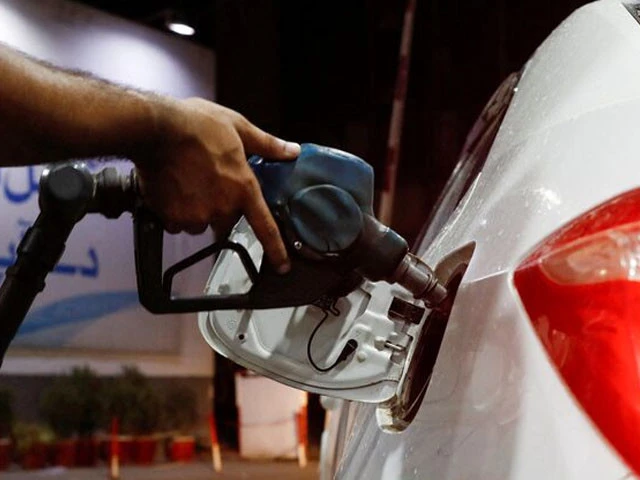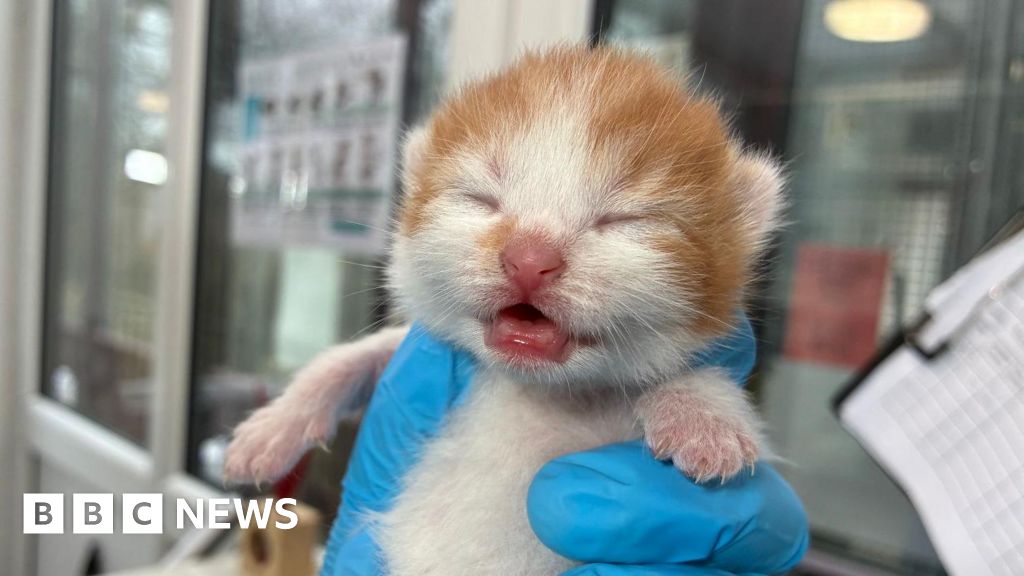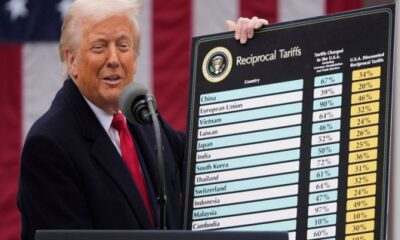Business
Govt cuts diesel price by Rs3 per litre, petrol unchanged | The Express Tribune

The federal government on Sunday announced a Rs3 per litre reduction in the price of high-speed diesel (HSD), while keeping the price of petrol unchanged for another fortnight.
According to an official notification issued by the Finance Division, the revised petroleum prices came into effect at midnight (September 1, 2025) and will remain applicable for the next 15 days.
Following the adjustment, the price of HSD has been brought down from Rs272.99 to Rs269.99 per litre. The price of petrol, however, remains unchanged at Rs264.61 per litre.
The changes follow the government’s routine fortnightly review of international oil prices and exchange rate movements.
Other petroleum products also saw slight reductions. The price of superior kerosene oil was lowered by Rs1.46, from Rs178.27 to Rs176.81 per litre. Similarly, light diesel oil dropped by Rs2.40, now priced at Rs159.76 from the earlier Rs162.37 per litre.
The revised pricing comes amid global crude benchmarks, where motor gasoline premiums currently stand at $6.37 per barrel and HSD premiums at $3.20 per barrel.
Also Read: Food prices soar in Lahore as floods disrupt supply
Domestic pricing also factors in the Inland Freight Equalisation Margin (IFEM)—Rs8.05 per litre for petrol and Rs6.20 for diesel—as well as the Petroleum Levy (PL) and the Climate Support Levy (CSL), components that significantly influence retail fuel costs.
This is the second consecutive fortnight during which the government has kept petrol prices unchanged while reducing the prices of other petroleum products by up to Rs12 per litre.
On August 15, the federal government cut the price of high-speed diesel (HSD) by Rs12.84 per litre. Similarly, the prices of superior kerosene oil and light diesel oil were also reduced by Rs7.19 and Rs8.20 per litre, respectively.
Business
Greggs to reveal trading amid pressure from cost of living and weight loss drugs

Greggs is to shed light on demand from customers as the high street bakery chain contends with the rise of weight loss treatments and cost of living pressures on shoppers.
The high street chain is also wrestling with other factors including increases to labour costs and tax changes.
As a result, on Tuesday March 3, Greggs is expected to reveal pre-tax profits of around £173 million for the year to December 27, representing a 9% drop.
In its previous update shortly after Christmas, Greggs pointed to a strong finish to 2025 as sales growth accelerated in the final quarter of the year.
Like-for-like sales growth rose from 1.5% in the third quarter to 2.9% in the final months of 2025.
Totals sales were up 7.4% in the final quarter amid a boost from the group’s continued store opening programme.
The company opened 121 stores last year.
However, analysts at Deutsche Bank said expectations “have already been set low” for 2026 and are “unlikely to change”.
In January, Greggs said it was “cautious but hopeful” about its outlook for 2026, highlighting “subdued” consumer confidence.
Roisin Currie, chief executive of Greggs, also warned alongside its previous update that there was “no doubt” appetite-suppressing medication is having an impact on the bakery chain’s business.
It may provide more detail on how this continues to change customer eating habits.
Meanwhile, the group also announced that inflation was likely to be shallower than last year.
The group increased the price on a number of products and deals last year, so shareholders will also be keen to see how these changes have continued to impact trading.
Aarin Chiekrie, equity analyst at Hargreaves Lansdown, said: “Investors are keen to hear how 2026 is shaping up in the early months.
“While the picture on the cost front is beginning to look more favourable, Greggs has plenty of other challenges still to wrestle with.
“Unhelpful changes to tax rules and minimum wages, slowing UK economic growth, and cost-conscious consumers are all weighing on the outlook.”
Business
Yorkshire Cat Rescue sees rise in abandoned cats as costs increase

Yorkshire Cat Rescue in Haworth says it paid £282,000 in vet bills in 2025 and rescued 925 animals.
Source link
Business
NSE IPO: Why It Won’t Debut On NSE, CEO Ashish Chauhan Breaks It Down

Last Updated:
Ashish Chauhan confirms National Stock Exchange will list its IPO on Bombay Stock Exchange, as Indian regulations bar self-listing.


The NSE operates the world’s busiest derivatives market by number of contracts traded.
The National Stock Exchange will look at other prominent exchanges like Bombay Stock Exchange (BSE) to list its upcoming IPO when it goes public. Managing Director and Chief Executive Officer Ashish Chauhan told ANI that Indian regulations prohibit the exchange from self-listing.
The NSE operates the world’s busiest derivatives market by number of contracts traded.
Regulatory Framework Bars Self-Listing
Chauhan said Indian regulations prohibit a stock exchange from regulating and listing itself, requiring it to seek admission on another recognised platform. “It’s a regulation of India, and we have to abide by that,” he told ANI.
The comments follow the Securities and Exchange Board of India’s (SEBI) no-objection certificate, which clears a key hurdle for the exchange’s long-pending initial public offering (IPO). Chauhan confirmed that the NSE would pursue listing on an alternative exchange such as the Bombay Stock Exchange (BSE).
Under India’s regulatory framework, exchanges cannot list on their own trading platforms due to conflict-of-interest concerns. Chauhan noted that while some global exchanges, such as Intercontinental Exchange (ICE), the parent of the New York Stock Exchange (NYSE), are listed on their own platforms, India’s rules do not permit such arrangements.
Offer For Sale Structure And Timeline
Chauhan said the IPO would be structured entirely as an Offer for Sale (OFS), with no fresh capital raised. “We are not going to raise money for ourselves,” he told ANI, adding that existing shareholders would be invited to indicate their interest in selling shares.
The exchange, which has nearly 195,000 shareholders collectively owning 100 percent of the company, will take a few months to prepare and file its Draft Red Herring Prospectus (DRHP). SEBI will then review the document before granting further clearance.
On valuation estimates of around USD 50 billion circulating in the market, Chauhan advised caution. Pricing, he said, would be determined closer to launch, based on financial performance, industry comparables, growth trends, and broader economic and geopolitical conditions. Merchant bankers appointed to the issue will advise the IPO committee on the offer price.
Transparency, Governance, And SME Inclusion
Chauhan described the IPO as procedural, aimed at providing liquidity to shareholders rather than funding expansion, noting that the exchange remains profitable.
He said public listing enhances transparency and governance through wider ownership and real-time disclosure requirements. Citing the example of Life Insurance Corporation (LIC), he said governance standards improved following its listing.
In the same interview, Chauhan said India has positioned itself as a cost-effective and inclusive capital market, particularly for small and medium enterprises (SMEs). He contrasted domestic listing costs with those in developed markets such as the United States, where expenses can range between USD 20 million and USD 30 million.
“In India, people are raising USD 1–2 million also. So how much they are spending is probably 5 to 10 per cent of that money to list,” he told ANI, adding that India’s ecosystem of merchant bankers, legal advisers and compliance professionals supports SME participation.
Follow News18 on Google. Join the fun, play games on News18. Stay updated with all the latest business news, including market trends, stock updates, tax, IPO, banking finance, real estate, savings and investments. To Get in-depth analysis, expert opinions, and real-time updates. Also Download the News18 App to stay updated.
March 01, 2026, 09:10 IST
Read More
-

 Business1 week ago
Business1 week agoUS Top Court Blocks Trump’s Tariff Orders: Does It Mean Zero Duties For Indian Goods?
-

 Fashion1 week ago
Fashion1 week agoICE cotton ticks higher on crude oil rally
-

 Entertainment1 week ago
Entertainment1 week agoThe White Lotus” creator Mike White reflects on his time on “Survivor
-

 Business1 week ago
Business1 week agoEye-popping rise in one year: Betting on just gold and silver for long-term wealth creation? Think again! – The Times of India
-

 Politics1 week ago
Politics1 week agoPakistan carries out precision strikes on seven militant hideouts in Afghanistan
-

 Sports1 week ago
Sports1 week agoBrett Favre blasts NFL for no longer appealing to ‘true’ fans: ‘There’s been a slight shift’
-

 Politics1 week ago
Politics1 week agoUS Supreme Court strikes down Trump’s trade tariff measures
-

 Entertainment1 week ago
Entertainment1 week agoSaturday Sessions: Say She She performs "Under the Sun"






